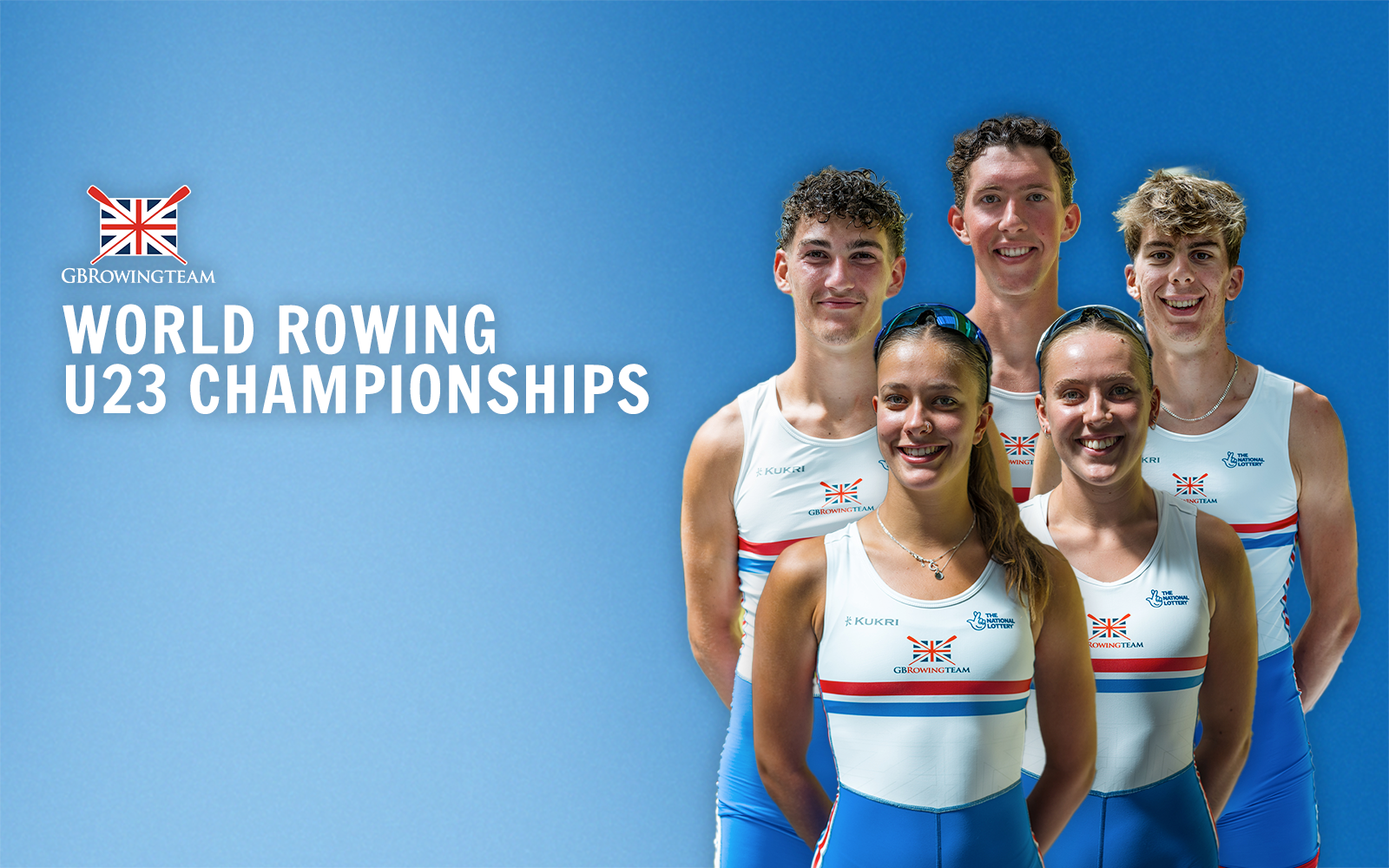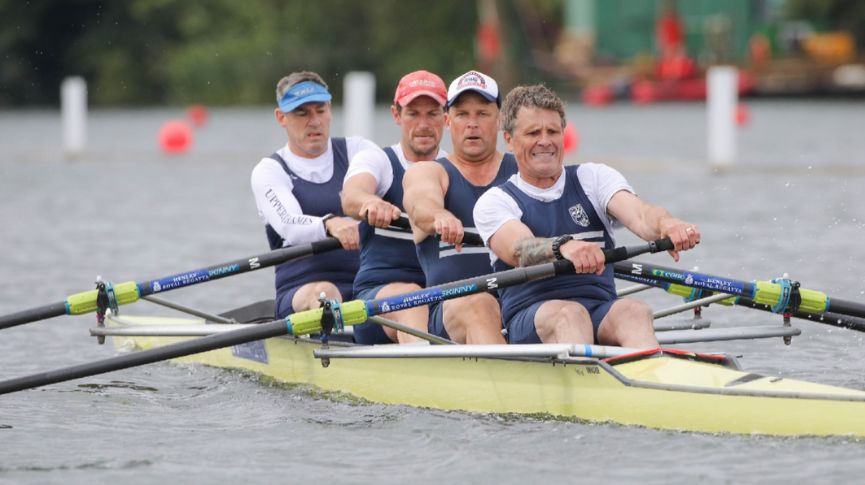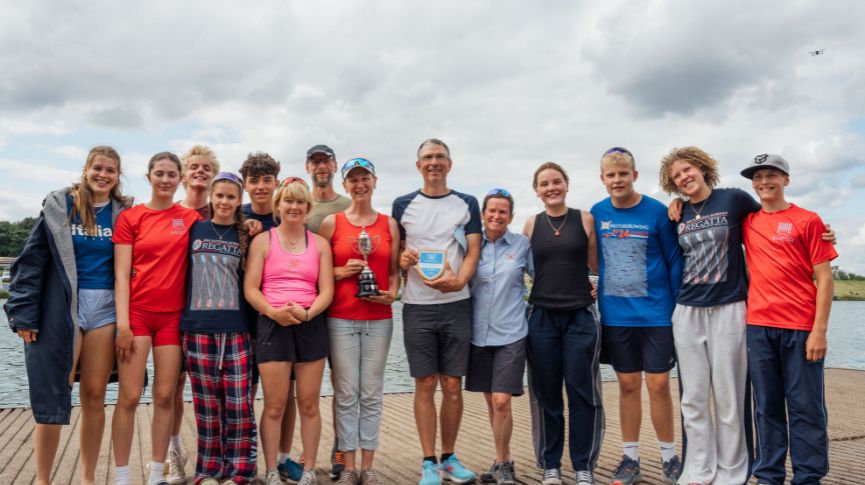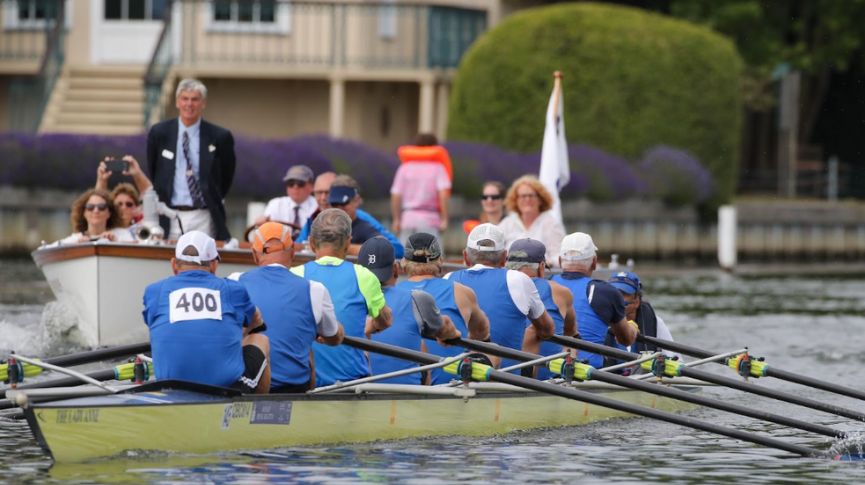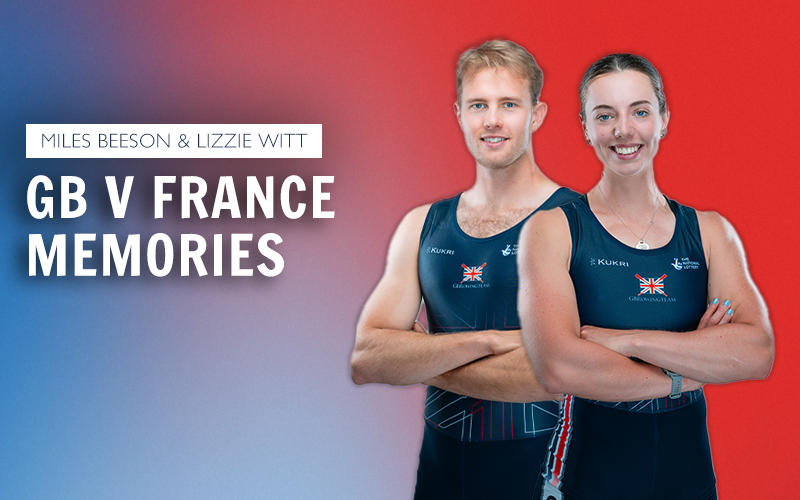In conversation with Saskia Budgett and Matt Rossiter
Rose Crawford, winner of the British Rowing junior writer’s competition, talks to GB rowers Saskia Budgett and Matt Rossiter as they prepare to race in Lucerne
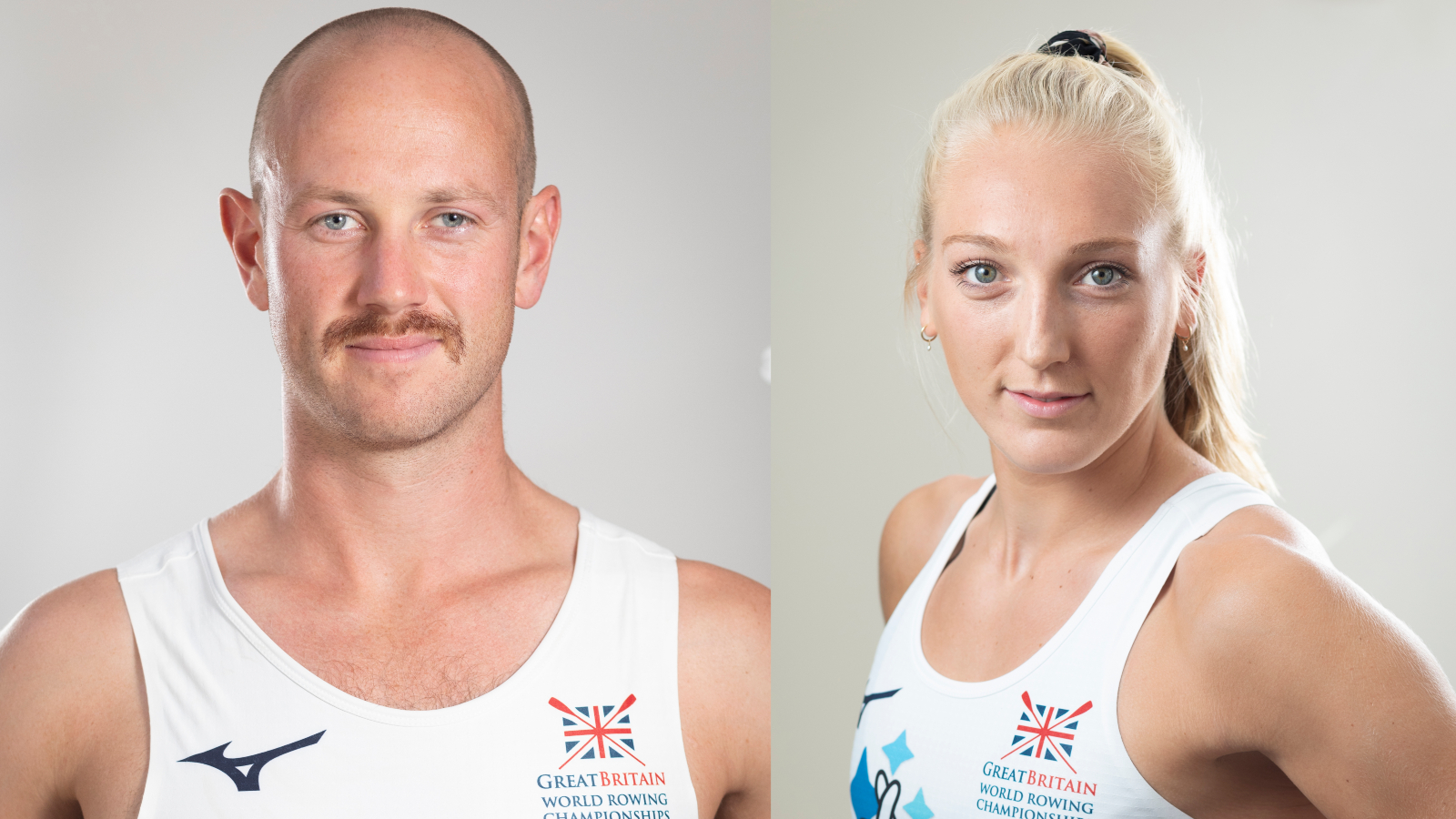
Matt Rossiter learnt to row at Abingdon School before attending Durham University. In 2011, he suffered a major back injury that kept him out of rowing for two years. He joined the GB senior squad in 2017 and rowed in the men’s four that won gold at the recent European Rowing Championships in Varese.
Saskia Budgett learnt to row at Tideway Scullers and went on to UCLA and graduated in 2019. She was in the women’s double that won bronze after a brilliant sprint finish at the recent European Rowing Championships.
Their next destination is Lucerne where Saskia is racing in the women’s double at the Final Olympic Qualification Regatta – and hoping to qualify the boat for Tokyo – while Matt is competing with the men’s four at World Cup II.
We talked to them about their rowing journeys, being a junior, university, lockdown and Olympic ambitions. Read on to find out more.
What do you love most about rowing?
Matt Rossiter: I think for me, I really like the people side of it. I learned to row at Abingdon and when I rowed in the single, I hated it. I used to stop the whole time. Right now, I row sweep obviously and I think if I didn’t have someone else with me, I’d probably stop again. So, I think for me, it’s definitely the people. Rowing with your mates, having a nice time and trying to make boats go fast is really what gets me out of bed in the morning really. I don’t know if that’s good! Do you feel the same?
Saskia Budgett: Yeah definitely. The teamwork side of things is definitely right up there in terms of why I love the sport. And just working with other amazing, strong, powerful women is just such a cool thing to be a part of.
Also being surrounded by like-minded people, right beside you, who are going to push as hard as they can. It’s just such a powerful feeling that you don’t really feel at any other parts of your life, so it’s just a huge privilege to be part of that. And also, I do just really enjoy pushing my body and seeing how far I can go in weights, on the ergo and on the water.
How did you get involved in rowing? What made you start?
SB: So, my dad rowed and then my older brother and sister also rowed, so it was one of those things where my dad was like, don’t row, don’t row, keep going with your other sports, but I just wanted to be like my older brother and sister. So, I just ended up rowing and I rowed at Tideway Scullers. It was such a family community kind of club and I just wanted to be involved in that, so I started rowing at quite a young age.
MR: Saskia’s being modest – her dad’s an Olympic champion. [Richard Budgett won Olympic gold in the men’s four at the 1984 Games] Yeah, I’m probably the same in that my dad rowed for Goldie (the Cambridge reserve crew). When I was younger, I was into other sports – I played loads of rugby and cricket and then because dad rowed, I thought I should give it a go.
I didn’t necessarily enjoy it to start with. I was a bit chubby when I was 14 and I was called big barrel Matt in the octo. I wasn’t really – I was just teased – and then gradually I fell in love with the sport. It helped me find my feet at school and I made some really good friends from it. Gradually, I fell into it more and more. So yeah, through dad really.
Saskia, how did you decide that you wanted to go to university in the US? And how did you pick UCLA in particular?
SB: So, I actually didn’t really know about the whole US situation until really, really late. I applied for veterinary science in the UK – I had wanted to be a vet since I was really young. I, actually, didn’t get in anywhere. So, I didn’t know what I was going to do and then some of my friends in the GB system were talking about going to the US and I was like ‘Wow, this sounds like an amazing opportunity’.
I chose UCLA because it’s a really great school academically and it’s sunny in California. Also, the rowing team and atmosphere seemed like the kind of a place that you’d want to be part of.
It was all very last-minute, so I decided in March or April and then I went in September. It was a bit of a whirlwind, but it’s one of the best decisions I’ve made. The US system is just amazing and we had a team of 60 girls and it was just such a cool experience to travel and experience other cultures.
Matt, what was it like making the transition from junior/U23 to senior, especially after such a long break with your back injury?
“Just being surrounded by such powerful strong women is the main thing that inspires me”
MR: I found it quite difficult because at school, we just rowed once a day and we trained really hard. Now the bulk of our training is UT2 and to do lots of that you need to be quite strong and your back needs to be good and mine was not in a very good position.
When I got to Durham University, my back flared up really badly. I could put together bits of training at U23s, but I found it quite difficult as a boy going into an adult world. But I think you just gradually get used to it and just take things day-by-day as it comes.
Every step along the way, I could have doubted that I’d be good enough, so I never thought I’d get to U23s – I never thought I could make it on the Leander programme which is kind of what spring boarded me into the national team. And then when I got onto the national team, I thought I wasn’t going to cope with it.
I think you just speak to people around you and ask for advice and your body just gradually gets used to it. And as you mature as an athlete and a person, you figure it out.
What is the best thing about being part of the GB Rowing Team?
SB: Just being surrounded by such powerful strong women is the main thing that inspires me and it’s great just being around people who love the same thing and with so many like-minded people. And there’s so much intention – every day everyone just goes out there with the intention to get the most out of it. I just love the atmosphere.
“There’s a lot of expectation and I’m in the coxless four at the moment and in the past, that boat has always won”
MR: I think we’re really lucky that there’s probably 70 athletes, but there’s also physios and sports scientists and every single boat has a coach, so even the support staff have the intention to make us better.
We’re in a really privileged position where all we have to do is just turn up and do our best, so everyone’s trying to drip-feed into how to get better. There’s a lot of history because GB has an unbelievable heritage in the sport and the fact that we can be part of that feels very special.
What’s the biggest challenge about being part of the GB Rowing Team?
MR: I think it links to what I said before: because the team has done so well, there’s a lot of expectation and I’m in the coxless four at the moment and in the past, that boat has always won.
And this whole Olympiad, we’ve not done particularly well. We’ve won bronze medals which I was quite happy with – but the expectation is to win. That’s quite difficult to deal with, but then, ultimately, all you can do every day is your best. And if that’s all you do then that’s life really, which is quite a good lesson.
But the training’s tough. We do two long rows a day and then a weights session and that takes a bit of getting used to and in those periods, you just feel totally knackered the whole time.
“My favourite quote is: ‘It is what it is and it ain’t what it ain’t’”
SB: So, I’m quite new to the team – this is my second year. I think I found it a bit of a shock going from university. I was towards the top of my university programme and then I came in and was pretty much bottom of the team here.
It’s quite a big shock to have such fierce competition and to have to rise up to that all the time. And sometimes that can be quite hard to deal with, but it does make you better although sometimes it is hard.
What advice would you give to your teenage selves?
SB: I think for me, I’d always just say focus on enjoying it and always keeping rowing in perspective because there are bigger things in life and although rowing seems like everything at the moment, it’s important just to remember why you do it and why you enjoy it.
“Surround yourself with radiators and not drains because that can make a huge difference”
MR: My advice would be really similar – I think enjoying it is really important. Also, I wish I didn’t worry so much, which I think is really easy to say… It could be about an email from the GB coach… ‘The coaches have put me in this boat, what does that mean? Or just generally I haven’t been invited to that party, that means I’ve got no friends.’
I think it’s just enjoying what you do and just knowing that you are in a good way and that things will come good. Oh, and my favourite quote is: ‘It is what it is and it ain’t what it ain’t’.
SB: I love that. Also, another one I think I’d say is to appreciate the people around you and surround yourself with radiators and not drains because that can make a huge difference.
From an outsider looking in, GB’s performance at the European Championships was a bit of a surprise. Do you feel that way, especially after not having as much water time as the other nations?
MR: Yeah, I was really pleasantly surprised. We have just been training against the clock since September and we had been doing percentages and not doing very well. We ended up doing fine (winning), but yeah you have no idea what the other countries are doing. We’ve just taken that result and are back to the drawing board and then just hoping to get faster and faster.
SB: The European Championships was my first senior race, so I was just loving the whole experience and lapping it up. Holly (Nixon) and I hadn’t been together for that long, so we were still finding our feet.
Our percentages weren’t great either, so we were not really sure what to expect going into it. I think just to be on the podium – we were so happy. And I think it’s just exciting for the whole team to start the year in that way and for more to come hopefully.


